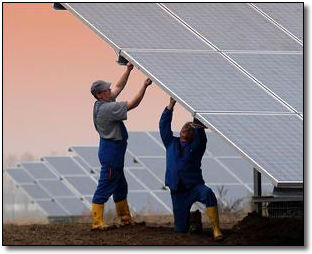
Image: RWE Schott Solar
 |
This 2 MW
installation in Neustadt, Germany is another sign of the growing
renewable energy industry in Europe (see next story). Image: RWE Schott Solar |
"Energy investments are long-term, and planning for the future
needs to begin well in advance."
- Prof. Arthouros Zervos, President of EREC
| Berlin, Germany -
January 22, 2004 [SolarAccess.com] New projections from the European
Renewable Energy Council (EREC) presented at a major conference of
theirs in Europe, show that use of renewable technologies could expand
to satisfy 20% of Europe's energy demand by 2020, a substantial increase
from their present level. Taking electricity generation alone, the proportion contributed by the five main renewable technologies sources - wind, hydro, photovoltaic, biomass and geothermal - in 2020 will have reached almost 34%, according to the group. The longer term assessment of the potential for renewable energy sources in Europe was carried out by EREC, the umbrella group representing renewable industry and trade and research associations, and the key findings were presented in Berlin by Prof. Arthouros Zervos, President of EREC (2) at an EREC conference that just wrapped up yesterday. - The White Paper target of 12% renewable energy by 2010 will be achieved if specific support actions are taken soon. - The target for 22.1% of electricity from renewables will be met if measures set out in the EU Renewables Directive are fully transposed and some additional measures are taken. - A contribution from renewables to total energy consumption of 20% by 2020 is possible. Over 600 participants from more than 45 countries attended the three-day European Conference for Renewable Energy - Intelligent Policy Options. At this event - one of the most important in years for the European renewable energy community - European political representatives debated crucial issues if renewables are to make more progress, especially how they can establish a stronger position in the global energy market. The conference's conclusions will provide Europe's input to the Global Conference for Renewable Energies to be held in Bonn next June. The conference was organized in 10 highly-interactive panels, regrouping more than 70 high-level panelists from all sectors of the business community (representatives from the industry, NGOs and other renewable energy stakeholders, as well as political decision makers) and discussed the most important policy issues related to the development of renewable energies. The discussions ranged from the impact assessment of the European Renewable Energy Campaign for Take-Off to existing and needed legislation promoting RES and will lead to new recommendations for "Intelligent policy options" for further growth of renewable energy technologies. "Renewables are essential in the campaign to tackle climate change and contribute to the further modernization of the energy sector", said Prof. Zervos. "As indigenous sources, renewables also help reduce Europe's dependence on energy imports and have a positive impact on both regional development and employment. The European renewable energy industry already has a yearly turnover of ý 10 billion (US$12.7 billion) and employs 200,000 people". Organizers said this is the first time the European renewable energy industry has taken coordinated action to deliver a complete market analysis and projection up to 2020. This new analysis argues that if progress can be achieved to add 6% of additional renewables over thirteen years (1997-2010), then a further 8% over the following ten years (2010-2020) is feasible. "Targets are an important element in any policy making initiative," Zervos said. "Without the targets set down in the renewables White Paper, for instance, the European Union would not have implemented the necessary directives on both renewable electricity and biofuels that followed in its wake. Energy investments are long-term, and planning for the future needs to begin well in advance. Establishing projections such as those presented by EREC is a vital first step." Renewable electricity grew at an annual rate of 4.8% between 1997-2001, and will need to increase that rate to 5.7% over the period up to 2010. The largest input will come from wind, which by that stage is projected to have reached an installed capacity of 180,000 MW. To reach the overall target for renewable energy, the report indicates that specific support actions should be taken soon to encourage some technologies, such as biomass and solar collectors, that are lagging behind. For instance, political action in the heating and cooling sector has to follow immediately, according to EREC. |
|
|
| For
Further Information: • EREC Please Note: SolarAccess.com and Arizonaenergy.org do not endorse the sites behind these links. We offer them for your additional research. Following these links will open a new browser window. |